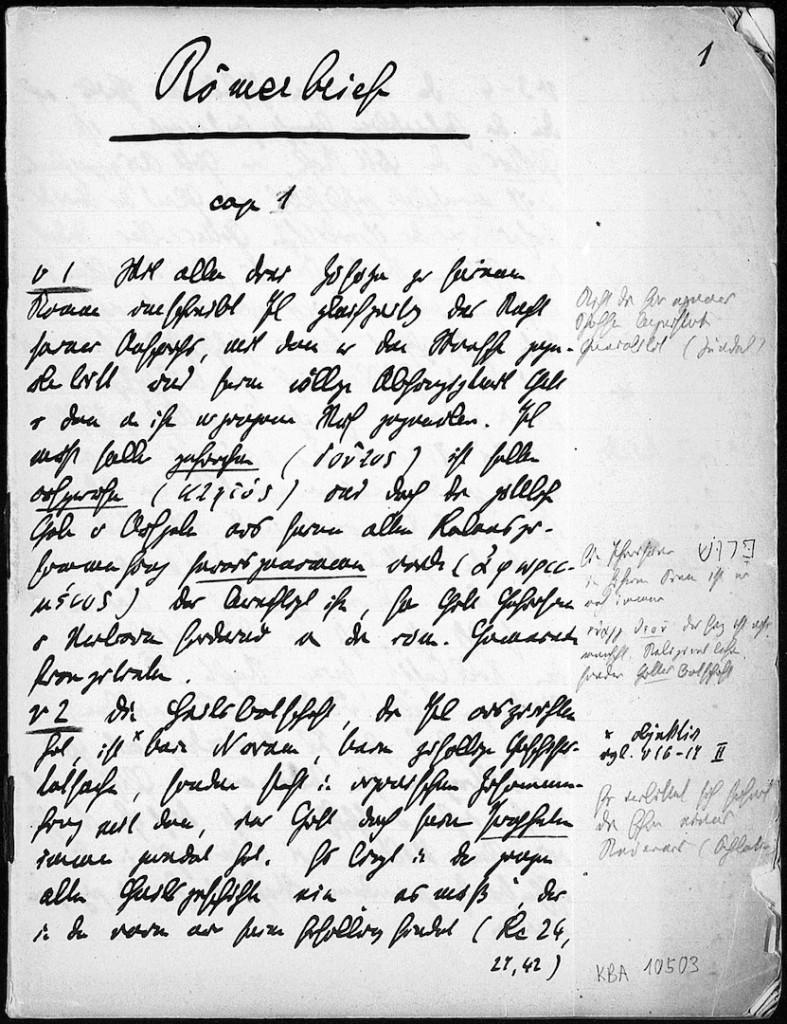 In his widely-acclaimed commentary on Romans, C. E. B. Cranfield says of Barth’s commentary,
In his widely-acclaimed commentary on Romans, C. E. B. Cranfield says of Barth’s commentary,
Of its importance as a turning-point in the history of theology there can be no doubt, and Barrett was certainly right to say that ‘to read it must be reckoned an essential part of a theological education’; but, while it rendered the Church, and can still render it, a much-needed service, it has very serious deficiencies as an exposition of Romans, and to take it for one’s main aid in studying the epistle would be to demonstrate one’s failure to learn from Barth’s maturer thinking and one’s lack of an essential element in theological seriousness, a sense of humour (Cranfield, Romans, 1:41-42).
Cranfield does not suggest that Barth was less than serious when he wrote his commentary, but he does seem to suggest that Barth was doing something less or at least, something other, than writing an exposition of Romans. It is true that later in his career Barth did pull back from the one-sidedness of his commentary, especially the second edition. But it is also the case that he did not repudiate his commentary, although he was happy for the first edition to “disappear from the scene” (Barth, The Epistle to the Romans tr. E. Hoskyns, 2).
Reception to Barth’s commentary was from the beginning subject to such criticism. In 1920 Adolf Jülicher gave a polite but damning review of the first edition, accusing Barth of being a ‘pneumatic,’ somewhat like Marcion in his exegesis of Paul. Karl Ludwig Schmidt echoed this judgement, as did Adolf Harnack who likened Barth to Thomas Müntzer—not quite Marcion, but unfavourable still. The young Bultmann dismissed Barth’s interpretation as ‘enthusiastic revivalism.’ (For references and broader discussion of these and other early reviews, see my Church as Moral Community, 184-190).
Nevertheless, we do well to recall John Webster’s suggestion that
Romans is not primarily a hermeneutical manifesto, or a piece of irregular dogmatics (that is, a set of theological reflections only loosely attached to the Pauline text); still less is it an encoded set of socio-political experiences or directives. It is a commentary, intended by Barth as such; and whatever abiding interest and worth it may have stands or falls by its success in fulfilling that intention. Barth meant what he said in his preface to Hoskyn’s idiosyncratic translation of the second edition: “My sole aim was to interpret Scripture” (Webster, in Greenman & Larson (eds), Reading Romans Through the Centuries, 205-206; note Barth’s citation is on page ix of the English edition, rather than page 11 as Webster reports).
I must say, however, that I applaud Barrett’s contention that ‘to read it must be reckoned an essential part of a theological education’!